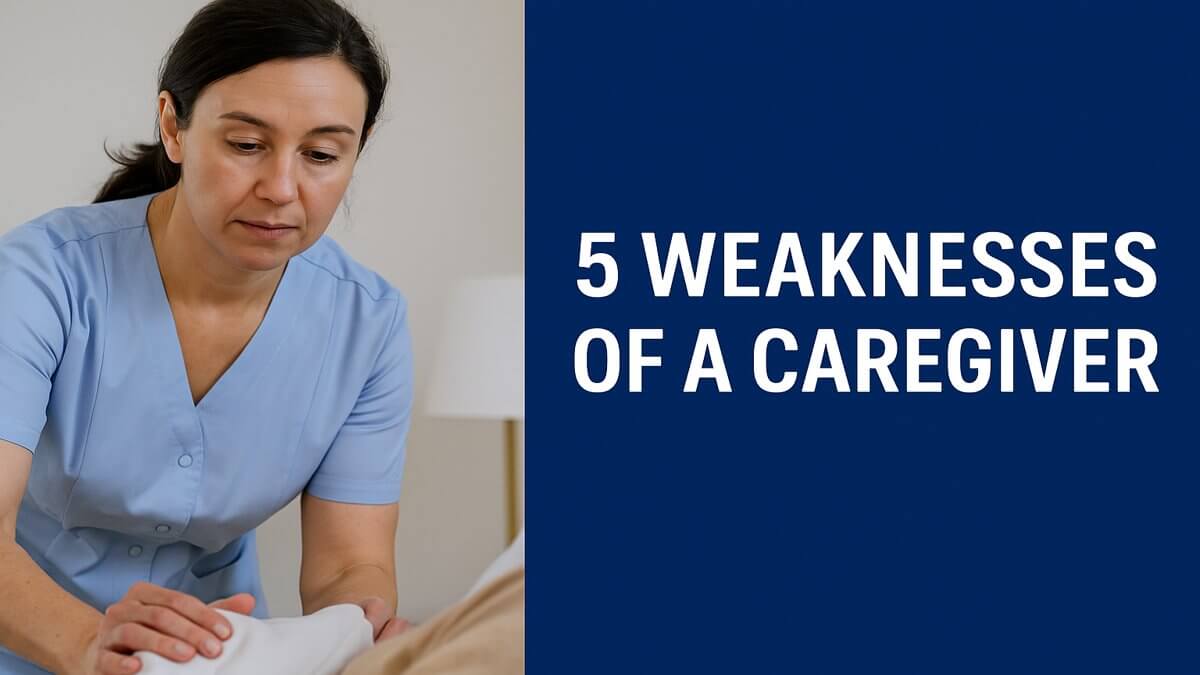Caring for an aging parent, spouse, or loved one is one of the most meaningful acts of love you can offer. Yet, it’s also one of the most challenging roles you’ll ever take on.
If you’ve ever wondered, “Is it supposed to be this hard?” you’re not alone. According to the National Alliance for Caregiving, over 53 million Americans are providing unpaid care for a loved one, juggling emotional, physical, and financial stress along the way.¹
The good news is that help is available in West Chester, PA, and beyond. Here are five common challenges family caregivers face and practical solutions and resources to help lighten the load.
5 Weaknesses of a Caregiver:
1. Feeling Isolated or Unsupported
Caregiving can feel lonely, especially if you’re the only one providing care or lack friends and family who truly understand what you’re going through. You might miss social events, phone calls, or even time for yourself.
Solution
- Join a caregiver support group.
- The West Chester Area Senior Center offers caregiver workshops and social events.
- Online communities like the Family Caregiver Alliance provide forums and webinars.
- Tap into local senior services.
- Many senior living communities and local nonprofits offer respite care, educational events, and caregiver resources.
2. Balancing Caregiving with Work, Family, and Personal Time
One of the toughest parts of caregiving is fitting it in around everything else—jobs, kids, marriages, and household responsibilities. It’s easy to feel like you’re constantly running on empty.
Solution
- Talk with your employer about flexible work schedules, remote work, or family leave benefits under the Family and Medical Leave Act (FMLA).
- Ask siblings, neighbors, or local organizations for help with errands or occasional care.
- Schedule short windows of self-care each day—even 10 minutes for a walk or a cup of coffee can make a difference.
Check Also: Caregiver Jobs in USA – Apply Now
3. Guilt or Anxiety About Not Being Able to “Do It All”
Caregivers often wrestle with guilt feeling bad for needing a break or for considering assisted living. Remember, caregiving is not about perfection. It’s about doing your best in a complex situation.
Solution
- Remind yourself that needing help doesn’t mean you’ve failed. It means you care enough to make sure your loved one has the best support possible.
- Practice self-compassion. You’re doing a tough job with a big heart.
- Talk to a mental health professional if guilt or anxiety becomes overwhelming. The Chester County Department of Mental Health offers local services.
4. Uncertainty About When or How to Seek Outside Help
Many caregivers wait too long to explore support options because they’re unsure when it’s “okay” to ask for help. The fear of making the “wrong” decision can lead to burnout.
Solution
- Watch for red flags such as increasing care needs, worsening health for your loved one or yourself, or growing physical or emotional exhaustion.
- Speak with a senior care advisor or visit a local senior living community to learn about options like assisted living, memory care, and respite services. Gathering information doesn’t mean you have to make a decision immediately, but it can provide peace of mind.
5. Neglecting Your Own Health and Well-Being
When every day revolves around someone else’s needs, it’s easy to push your own health aside. However, chronic stress, poor sleep, and burnout ultimately hurt both you and your loved one.
Solution
- Prioritize sleep, healthy meals, and gentle movement.
- Keep up with your own medical appointments and mental health check-ins.
- Consider respite care. Many senior living communities in West Chester, including Arbor Terrace Willistown, offer temporary stays so you can rest and recharge.
According to the Centers for Disease Control and Prevention, about 15 percent of caregivers say their health has worsened due to caregiving responsibilities.² Prioritizing your own health isn’t selfish—it’s essential for sustainable caregiving.
Local Resources for Caregivers in West Chester, PA
If you’re looking for help in the West Chester area, here are excellent places to start:
- Chester County Department of Aging Services
Offers caregiver support, respite programs, and help navigating resources. - West Chester Area Senior Center
Hosts caregiver workshops, social programs, and connections to local services. - PA Link to Community Care
Connects residents to home care, transportation, benefits counseling, and more. - Family Caregiver Alliance
A national resource for education, support groups, and legal guidance.
Visit Website
You’re Never Alone Help is Available:
Caregiving is an act of profound love. But it’s also a journey filled with tough decisions, fatigue, and emotional challenges. If you’re feeling overwhelmed, know that you do not have to do it all alone.
Whether you need a support group, respite care, or simply someone to help you explore your options, help is out there. If you’re considering senior living or want guidance on how to start the conversation with your loved one, we’re here to help.
Download our free guide: Talking to Your Parent About Senior Living for practical tips, conversation starters, and local resources tailored to West Chester families.
Remember, taking care of yourself is the best way to keep caring for those you love.
Frequently Asked Questions:
What are common weaknesses or challenges caregivers face?
Caregivers often struggle with emotional exhaustion, physical fatigue, lack of patience, difficulty setting boundaries, and feelings of isolation or burnout.
How does lack of patience affect a caregiver’s effectiveness?
Low patience can cause frustration and strained communication with the care recipient, making caregiving more challenging and reducing the quality of care provided.
Why do caregivers sometimes feel overwhelmed or stressed?
The constant demands of caregiving, unpredictable behaviors of the care recipient, and balancing personal responsibilities can lead to overwhelming stress and mental fatigue.

